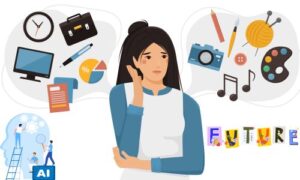Is traditional education keeping up with our fast-changing world? As technology evolves and global dynamics shift, this question grows more pertinent.In the 21st century, education faces numerous challenges. Traditional methods may no longer be adequate to prepare students for the uncertainties of the future. To ensure students thrive in an ever-changing world, educational systems must adapt and evolve.
Drivers of Change in Education
Technological Advancements: Cutting-edge advancements such as AI, virtual reality (VR), and online learning platforms are transforming the landscape of education. These innovations offer promising opportunities for tailored, personalized learning experiences that cater to the unique needs of each learner.
Shifting Job Market: Automation and technological progress are reshaping the job market, eliminating certain positions while introducing new ones. To thrive in this evolving landscape, students must develop versatile skills like critical thinking, problem-solving, and adaptability that transcend specific job functions.
Evolving Global Landscape: In our interconnected world, nurturing global citizenship is vital. Education should ready students for diverse work environments, equipping them with the skills to engage in effective intercultural communication and collaboration.
Reshaping the Learning Experience
Focus on Skills, Not Just Content:Education is progressing beyond simply acquiring knowledge to prioritize vital life skills. Creativity, collaboration, communication, and digital literacy are now esteemed as highly as academic excellence.
Personalized Learning: Personalized learning recognizes the individuality of each student, including their strengths, weaknesses, and learning styles. Technology is instrumental in facilitating personalized learning experiences through adaptive learning platforms and tailored instructional approaches.
Active Learning and Collaboration: Active learning methodologies are supplanting rote memorization, fostering engagement and critical thinking in the classroom. Project-based learning, collaborative assignments, and real-world problem-solving scenarios are becoming prevalent, enhancing student participation and skill development.
Lifelong Learning: In today’s fast-paced world, learning extends far beyond graduation. Lifelong learning initiatives promote ongoing skill development and the quest for new knowledge throughout individuals’ personal and professional journeys.
Challenges and Opportunities
Equity and Accessibility: Addressing disparities in resources and opportunities is crucial to ensuring equitable access to quality education. Every student deserves a fair chance at success, and eliminating barriers to education is essential in achieving that goal.
Role of Educators: Educators are transitioning from being mere conveyors of information to becoming facilitators, mentors, and learning coaches. Their evolving role centers on nurturing critical thinking, problem-solving skills, and encouraging self-directed learning among students.
Building a Future-Ready Workforce: Education serves as a cornerstone in preparing students for the future workforce. By fostering innovation, creativity, and adaptability, educational institutions play a vital role in equipping individuals to excel in an ever-evolving economic environment.
The Power of Collaboration: Collaboration among educators, policymakers, and industry leaders is pivotal in reshaping education to meet future needs. By joining forces, stakeholders can identify emerging trends, devise innovative solutions, and ensure that education remains relevant and impactful in a rapidly changing world.
Conclusion
The landscape of education is evolving rapidly, driven by technological advancements, changes in the job market, and shifting global dynamics. To prepare students for the future, educational systems must adapt and prioritize the development of essential skills alongside academic knowledge.
Vision for the Future: Imagine a future where education is flexible, adaptable, and student-centered. A future where every individual has access to quality learning opportunities and the support they need to succeed. Embrace change and advocate for innovative approaches to education. Together, we can shape a future where every learner has the tools and knowledge to thrive in a rapidly changing world.






